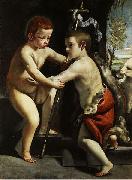Großhandels China Öl Gemälde & Rahmt Ein |
|||||||||||

|
|||||||||||
|
|
|
||||||||||||||
|
Guido Cagnacci
(January 19, 1601 - 1663) was an Italian painter of the late-Baroque period, belonging to the Forle painting school and to the Bolognese School. Born in Santarcangelo di Romagna near Rimini, he died in Vienna in 1663. He worked in Rimini from 1627 to 1642. After that, he was in Forle, where absorbed the lesson of the Melozzo's painting. Prior to that he had been in Rome, in contact with Guercino, Guido Reni and Simon Vouet. He may have had an apprenticeship with the elderly Ludovico Carracci. His initial output includes many devotional subjects. But moving to Venice under the name of Guico Baldo Canlassi da Bologna, he renewed a friendship with Nicolas Regnier, and dedicated himself to private salon paintings, often depicting sensuous naked women from thigh upwards, including Lucretia, Cleopatra, and Mary Magdalene.This allies him to a strand of courtly painting, epitomized in Florence by Francesco Furini, Simone Pignoni and others. In 1650, he moved to Venice. In 1658, he traveled to Vienna, where he remained under patronage of the emperor Leopold I. His life was at times tempestuous, as characterized by his failed elopement (1628) with an aristocratic widow. Some contemporaries remark him as eccentric, unreliable and of doubtful morality. He is said to have enjoyed the company of cross-dressing models. |
||||||||||||||
|
|
||||||||||||||
|
||||||||||||||
|
|
||||||||||||||
| Guido Cagnacci
(January 19, 1601 - 1663) was an Italian painter of the late-Baroque period, belonging to the Forle painting school and to the Bolognese School. Born in Santarcangelo di Romagna near Rimini, he died in Vienna in 1663. He worked in Rimini from 1627 to 1642. After that, he was in Forle, where absorbed the lesson of the Melozzo's painting. Prior to that he had been in Rome, in contact with Guercino, Guido Reni and Simon Vouet. He may have had an apprenticeship with the elderly Ludovico Carracci. His initial output includes many devotional subjects. But moving to Venice under the name of Guico Baldo Canlassi da Bologna, he renewed a friendship with Nicolas Regnier, and dedicated himself to private salon paintings, often depicting sensuous naked women from thigh upwards, including Lucretia, Cleopatra, and Mary Magdalene.This allies him to a strand of courtly painting, epitomized in Florence by Francesco Furini, Simone Pignoni and others. In 1650, he moved to Venice. In 1658, he traveled to Vienna, where he remained under patronage of the emperor Leopold I. His life was at times tempestuous, as characterized by his failed elopement (1628) with an aristocratic widow. Some contemporaries remark him as eccentric, unreliable and of doubtful morality. He is said to have enjoyed the company of cross-dressing models. Jesus and John the Baptist as children, oil on canvas, 126 x 93 cm Date 17th century cjr |
||||||||||||||
|
Related Paintings to Guido Cagnacci :. |
||||||||||||||
|
|
||||||||||||||
|
|
||||||||||||||
|
KONTAKTIEREN Sie UNS |







